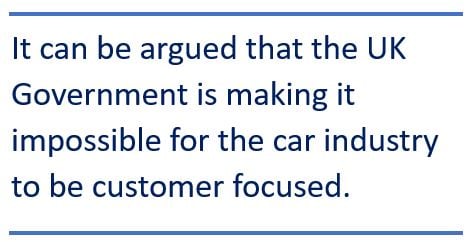When motorists want one thing, but national policies are driving vehicle manufacturers to offer less of it, that risks the prosperity of the UK motor industry and the people who work within it, argues AM's regular columnist Professor Jim Saker, emeritus professor of Loughborough University's business school and president of the Institute of the Motor Industry.
Go to any motor industry conference, product launch or training programme and there is always an exhortation for the people involved to be customer centric. By keeping the customer central to all that we do success is guaranteed to follow.
This is pushed out as a mantra for how the industry should behave.
When motorists want one thing, but national policies are driving vehicle manufacturers to offer less of it, that risks the prosperity of the UK motor industry and the people who work within it, argues AM's regular columnist Professor Jim Saker, emeritus professor of Loughborough University's business school and president of the Institute of the Motor Industry.
Go to any motor industry conference, product launch or training programme and there is always an exhortation for the people involved to be customer centric. By keeping the customer central to all that we do success is guaranteed to follow.
This is pushed out as a mantra for how the industry should behave.
 To support and reinforce this a set of metrics are imposed that supposedly measure how customer centric the business is over a period of time.
To support and reinforce this a set of metrics are imposed that supposedly measure how customer centric the business is over a period of time.
I have always been puzzled by why this measurement is necessary, if the premise is correct surely the long-term success of the organisation would be a sufficient indicator.
Anyway, this whole debate becomes irrelevant when you examine what is going on in the current market.
It can be argued that the UK Government is making it impossible for the car industry to be customer focussed. If you accept that being customer centric involves delivering products that customers want in a professional and timely way, then the prospect of it happening becomes a pipe dream.
With the imposition of its 22% target for EV sales in 2024 the authorities have driven the motor industry from being customer centric to being politically compliant.
The market is showing that retail customers don’t want EVs at the moment and that it is only when incentivised (or bribed) by tax benefits in the company car market that there has been any significant take up.
The issue of the charging infrastructure in different parts of the country coupled with high prices and inflated insurance costs are turning customers off. It appears that self-charging hybrids and high MPG ICE vehicles are currently a preferred option.
Many OEM’s have been distorting the market by under supplying ICE and self charging hybrid vehicles in order to hit the Government imposed target.
However, the most explicit statement about this issue has come from Martin Sander of Ford who stated at the Future of the Car Summit in London: “We can’t push EVs into the market against demand. We’re not going to pay penalties. We are not going to sell EVs at huge losses just to buy compliance. The only alternative is to take our shipments of [engine] vehicles to the UK down and sell these vehicles somewhere else.’’
We therefore end up with the customer wanting one thing and the Government dictating or at least making it very difficult for the industry to be focussed on customer needs.
It is probably alright for Governments to be unpopular but this policy impacts on sales performance in both new and used markets and with less cars available to sell that customers actually want it impacts on business performance but also the wages of people working in the sector.
Author: Professor Jim Saker, president of the Institute of the Motor Industry
Login to continue reading
Or register with AM-online to keep up to date with the latest UK automotive retail industry news and insight.
























Colin M - 12/06/2024 13:15
Finally, somebody talking sense. The whole EV agenda has been born through government interference and the industry has had to comply or face massive fines. The only way to run a successful business is for that business to be consumer led.